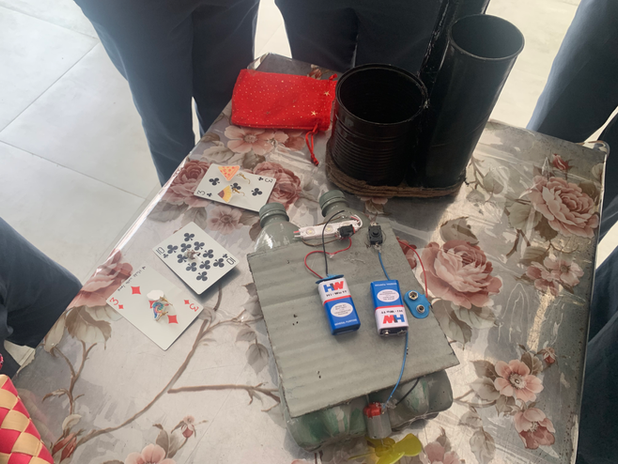Thanush Sakthivel
This is me
I am an aspiring entrepreneur passionate about turning ideas into impactful ventures that shape the future. Fascinated by product design and materials science, I explore how innovative concepts and engineering principles can be transformed into tangible solutions. Through internships across textiles, manufacturing, and industrial processes, I've gained hands-on exposure to how materials, design, and workflow influence real-world outcomes, strengthening my drive to connect technical knowledge with business strategy. I aim to build ventures that pioneer sustainable products, optimize processes, and create value where entrepreneurship, design, and innovation converge.
STUDENT | ENTREPRENEUR | ENGINEER | ATHLETE | SUSTAINABLE | INNOVATOR | LEADER
ACADEMICS
ENTREPRENEURSHIP
FOUNDER

Luxe was born from a realization — that beauty shouldn’t come at the planet’s expense. Growing up in a textile family, I loved the art of weaving, but witnessing its environmental cost pushed me to create change.
Through Luxe, I reimagine traditional Indian wear using sustainable fibers like banana and hemp — blending innovation with heritage. The journey wasn’t easy; my first experiment literally caught fire. But it taught me patience, resilience, and the importance of conscious creation.
Today, Luxe stands for mindful fashion — fair wages, minimal waste, and timeless design. It’s my way of honoring tradition while redefining its future, one sustainable weave at a time.
FOUNDER

UrbanSprout began as a simple thought — what if every home could grow a little green? It’s a work in progress, an evolving project that aims to help city residents transform unused spaces into small, thriving ecosystems.
Through an upcoming app and workbook, I’m designing tools that make sustainable living effortless — using AI to personalize plant care based on space, lifestyle, and climate. The goal is to help people grow herbs and utility plants in the most unexpected corners of their homes, blending nature with modern living.
Urban Sprouts is still sprouting — but like every seed, it’s growing with purpose. Because sustainability doesn’t always begin in vast fields; sometimes, it starts in a single pot by the window.
RESEARCH
My research, “Should the Fashion Industry Adopt Sustainability, and If So, How?”, explores the environmental, social, and economic impact of modern fashion production. What began as curiosity turned into a deep dive into how the industry can evolve without compromising creativity or profitability.
I studied global sustainability practices and identified key barriers like cost, supply chain complexity, and consumer behavior. Through this, I proposed practical solutions — from circular design and ethical sourcing to policy incentives and consumer education — aimed at helping brands transition to more responsible models.
This project allowed me to see sustainability not just as an ideal, but as a system — one that requires innovation, empathy, and balance between people, planet, and profit.
SOCIAL INITIATIVES
AVANI
Avani was born from a simple idea — to turn textile waste into something meaningful and lasting. We collect discarded fabrics from local workshops and transform them into durable, reusable bags designed to replace single-use plastics. So far, we’ve upcycled over 2,000 kilograms of textile scrap into 10,000+ Avani bags, replacing an estimated 1 million plastic bags and preventing nearly 7 tonnes of waste from entering landfills and oceans.
Beyond reducing waste, Avani creates local employment — supporting a team of 12 artisans and stitchers — and empowers them with new skills and fair opportunities. Our goal is to prove that sustainability can be practical, beautiful, and accessible — that even small, thoughtful choices can spark lasting change.
SALEM FIGHTS COVID
Salem Fights COVID began during the height of the pandemic as a local response to bridge urgent healthcare gaps. What started as a simple idea — connecting people in need with real-time hospital and resource information — grew into a verified online platform that served as a lifeline for thousands of residents.
Through the site, citizens could instantly access live updates from 80+ hospitals, including bed availability, vaccination centers, and testing locations. The platform received over 11,000 views, helping connect families to oxygen cylinders, PPE kits, and other critical medical supplies. In partnership with local organizations and social clubs.
The initiative proved how technology, empathy, and collaboration could come together to save lives.
WASTE TO WEALTH
Waste to Wealth began as a school-wide sustainability project to show how creativity can transform everyday waste into something useful and valuable. The initiative focused on turning discarded materials into functional and aesthetic products while raising awareness about circular economy principles among students.
Over the course of the project, 80 kilograms of waste were collected and repurposed into toys, photo frames, and home décor items, all made entirely by students. These products were showcased and sold within the school community, promoting the idea that sustainable living can start with small, hands-on action.
The initiative not only reduced waste but also inspired hundreds of students to see value in what’s often thrown away.
AAKKAM – Sethu Meena Trust
As an active member of AAKKAM, a community initiative under the Sethu Meena Trust, I dedicated over six years to hands-on environmental action and awareness. My work focused on bridging small-scale community efforts with measurable environmental outcomes — from organizing clean-up drives to educating villagers about sustainable waste practices.
I personally led and participated in 20+ awareness campaigns on tree conservation, waste management, and sustainability, reaching 100+ villagers across rural Salem. I also helped coordinate the complete cleaning of two major city lakes spanning over 50 hectares, restoring local ecosystems and improving urban water health.
Through AAKKAM, I learned how consistent, grassroots action can create meaningful impact.


























_edited.jpg)



_edited_edited.png)

_edited.jpg)



























